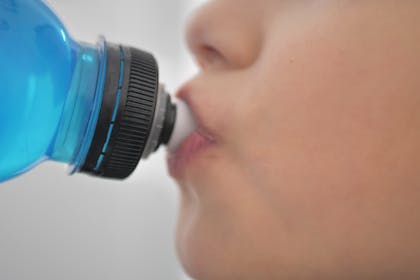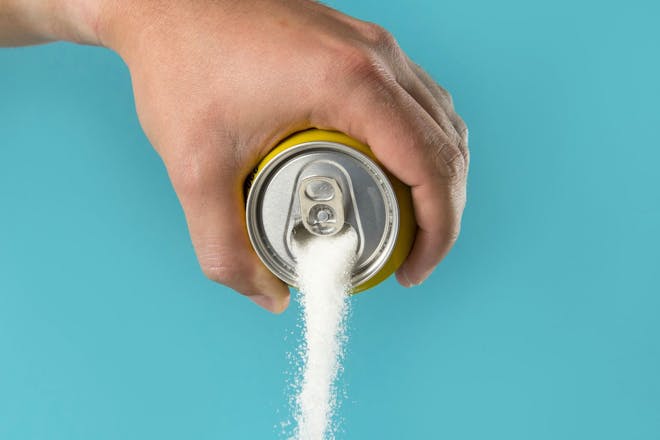What are the dangers of energy drinks and should we ban sales to children – a nutritionist's view

A nutritionist weighs in about whether energy drinks are bad for children and teenagers
The dangers of energy drinks are no doubt at the forefront of parent’s minds following the news that a primary school child suffered a cardiac episode after drinking Prime. But the information surrounding them can be confusing. We asked a nutritionist about whether energy drinks are bad for you and if children and teenagers should drink them.
Prime, as a leading energy drink fronted by 2 social media influencers – KSI and Logan Paul – is one of the most popular energy drinks on the market. It made a staggering £200m profit in its first year. And the brand’s fanbase is largely school age children.
We found out what really goes into energy drinks, if they are dangerous for children and what parents can do to stop their kids from drinking high-caffeine and sugar concoctions that could be dangerous?
- The urgent energy drink warning amid organ damage fears in children
- Parents warned over ‘very dangerous’ Prime drink after child has stomach pumped
- There's a new Prime flavour in the UK
- Politician calls Prime Energy 'cauldron of caffeine'
What are energy drinks?
Energy drinks have surged in popularity in recent years largely due to their connection to the health and wellness market. 'They are drinks that are designed to give you a quick boost of energy, due to the high sugar content,' explains Claire Hitchen, Registered Nutritionist mBANT MSc and co-founder of Mini Tummies, specialising in baby and child nutrition.
'These drinks are often marketed as a way to improve concentration, increase alertness, enhance physical performance, and combat fatigue,' she say. 'They also typically contain ingredients like caffeine, vitamins and flavourings.'
Popular energy drinks in the UK include:
- Prime Energy
- Monster
- Red Bull
- Lucozade Energy
- Rockstar Energy Drink
- Relentless Energy
- Carabao Energy
- Mountain Dew Energy
- V Energy
- Power Horse
- C4 Energy
- Nocco
What is the difference between energy and sports drinks?
Energy drinks tend to be packed full of quick-fix energy-enhancing ingredients including sugar and caffeine, while flavoured sports drinks are designed to provide electrolytes and replace lost fluids during physical activity.
However, both types of drinks may also contain a mixture of other ingredients which may not be suitable for young people including herbal supplements and naturally occurring caffeine.
Are energy drinks banned for kids in the UK?
More than two-thirds of 10- to 17-year-old children and a quarter of 6- to 9-year-olds are said to regularly consume energy drinks in the UK, according to government statistics. While there are proposals to ban them for under 16s, those are still under consultation.
How old do you have to be to buy energy drinks in the UK?
But while several leading supermarkets have already banned the sale of energy drinks to under 16s, it is not currently a legal requirement and kids can still easily purchase them from smaller retailers.
Are energy drinks safe for kids to drink?
As a child nutritionist, Claire advises parents not to allow their kids to consume energy drinks.
'I don’t often like to use "good" and "bad" labels, as I believe in everything in moderation, but energy drinks are one product I do advise kids and teens to avoid,' Claire says. 'Not only can energy drinks fill them up without providing any nutritional value, but they have been linked to type 2 diabetes, as well as increased risk of unhealthy weight gain and tooth decay.'
.jpg?w=660&h=440&auto=compress%2Cformat)
How much sugar is in energy drinks?
The sugar content can vary depending on the brand, but most energy drinks have an alarmingly high sugar content.
'The two leading energy drink brands in the UK contain around 55g of added sugar per 500ml serving, making up as much as 60% of the ingredients,' says Claire. 'Other brands can pack in as much as 78g of added sugar per 500ml - that’s the equivalent of 20 teaspoons and more than three times the recommended maximum daily intake of free sugars for adults.'
'This sugar can be added in different forms, such as glucose, sucrose (table sugar) or syrup,' she adds. 'For energy drinks marked "diet" or "zero", this sugar is usually replaced with artificial sweeteners to reduce the calorie content.'
How much caffeine is in energy drinks?
The high caffeine content in energy drinks is equally concerning when it comes to children. 'Sadly many energy drinks don’t reveal the amount of caffeine on the labels, as this isn’t a requirement by law,' warns Claire. 'They often get away with simply stating “high caffeine content”, where they contain over 150mg of caffeine. But this doesn’t tell shoppers exactly how much.'
'Typically, a 500ml can of an energy drink can contain around 160mg of caffeine,' she adds. 'To put it into perspective, that’s about the same amount of caffeine as you’d find in 2 cups of coffee.'
The dangers of energy drinks for children
Energy drinks can pose a serious risk to children and teenagers for a number of reasons.
Caffeine can increase heart rate, blood pressure and impact sleep quality
When kids or teens consume energy drinks, they might temporarily feel more alert and have a spike in energy, says Claire. However, 'consuming high amounts of caffeine in energy drinks can increase their heart rate and blood pressure, as well as impact sleep and result in headaches or stomach pains. Particularly as young people have a lower tolerance to caffeine than adults.' According to John Hopkins, caffeine can also cause sleep disturbances and acid reflux in children.
Sugar and caffeine can interfere with healthy development
While children’s bodies are still developing, the mix of high sugar and caffeine can interfere with normal growth and development too, says Claire. 'For example, caffeine can impact the absorption of calcium, which is really important for developing bones.'
Herbal supplements are not FDA-approved
But it’s not just the high caffeine and sugar content that should be cause for concern. Many energy drinks also contain a potent mix of stimulants and additives such as taurine and guarana that have not been FDA-approved. In the absence of any reliable studies testing the effects of caffeine consumption together with ‘herbal’ ingredients on children, the health implications are worrying at best.
Energy drinks can impact heart health
Daily consumption of energy drinks has also been linked to heart health, says Bridget Benelam, Nutrition Scientist at Public Health Nutrition. 'Extremely high consumption of caffeine has been associated with heart complications and can have a harmful effect on the nervous system,' she warns.

The mental health dangers of energy drinks for children
As well as the physical effects, consuming energy drinks can have mental health implications too, warns Claire 'Irritability, hyperactivity, insomnia, anxiety, problems with regulating their behaviour and difficulty concentrating' are just some of the worrying side-effects.
'The quick energy boost is often followed by a crash, leading to more fatigue and lower mental performance,' she explains. 'This rollercoaster effect can be disruptive to a young person’s ability to learn and perform well in school or other activities.'
Energy drinks and addictive behaviour
Energy drinks are often marketed to adolescents. Regularly consuming energy drinks can change the part of the brain related to reward and addiction during this critical life stage, potentially leading to problems with drugs and alcohol or overeating further down the line.
'This can affect their choice of food and drink more widely, as they might seek the sensation of these drinks, alongside increasing the likelihood of eating a poor diet with high amounts of fast food,' says Claire.
Should parents ban energy drinks at home?
As with all positive lifestyle habits, health and wellbeing begins at home. 'Research suggests when parents consume energy drinks, this is a key driver of consumption among their children too,' says Claire.
Instead of energy drinks, give children healthier alternatives. 'Try sticking to healthier ways to hydrate and keep their energy levels up with water, milk or diluted fruit juice, alongside a varied diet with plenty of fruits, vegetables, wholegrains, healthy fats, lean proteins, beans and pulses,' advises Claire.
'Physical activity and getting plenty of sleep is also important for fighting fatigue without the need for sugar-ladened energy drinks,' adds Claire. 'If they’re looking for an "energy boost", go for a handful of nuts, or some chopped up fresh fruit and live yoghurt.'
Related content


.jpg?w=285&h=190&fit=crop&auto=compress%2Cformat&rect=0%2C0%2C1500%2C1000)





